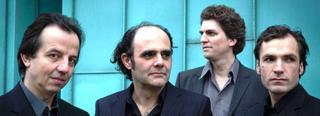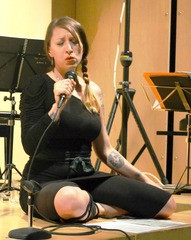|
Back
Music As Punishment and Exhilaration New York
Austrian Cultural Forum
06/29/2016 -
Alberto Hortigüela: Die Sprache ist die Strafe (United States Premiere)
John Cage: Music for Marcel Duchamp (arranged by Martin Smôlka) – Dream (arranged by Daisy Press)
Georg Friedrich Haas: Quartet for Four Guitars
Bernhard Lang: The Cold Trip Part I (United States premiere)
Daisy Press (Soprano)
Aleph Guitar Quartet: Andrés Hernández Alba, Christian Wernicke, Wolfghang Sehringer, Tillmann Reinbeck (guitar)

Aleph Quartet (© Courtesy of the artists)
”To use women or guitars, spend time tuning them correctly.”
Spanish proverb
Forget the outmoded sexist thought. As for the concert of the Aleph Guitar Quartet last night at the Austrian Cultural Forum, forget the “correct” tuning as well. The four contemporary works had tunings unimaginable by Segovia or Leadbelly. As well as techniques, sounds, rhythms which were both as forward as the future–and probably as backward and elemental as the first North African guitars more than a millennium ago.
In other words, this concert needed–and certainly incurred–the most intense concentration from the audience. For the four instrumentalists of the Aleph Guitar Quartet rarely strummed their guitars. They used them as percussion, as bell, as orchestra, as solo and (quoting the title of Ingmar Bergman’s film) as both cries and whispers.
And if one never always got the cohesion or the structure at first hearing, one was amazed that so much was being done.
In fact, the very first piece had a title which, paraphrased, could sum up the concert: Die Sprache ist die Strafe (“Language is the punishment”). Not language as the punishment, but perhaps the musical language, a language which was euphonious, curious, seductive in its own right. But was a punishment to understand.
Alberto Hortigüela inadequately explained his work in words (“The composer takes the extent of his flaws and prejudices as a punishment”.) The quartet spoke in repetitions, drumbeats and glissandi on the frets. At times, one heard what seemed like the familiar (the drumbeats before the Beethoven Eighth Symphony first movement), but this soon disappeared into the maelstrom of sounds coming from the players.
The evening would have more surprises. But the virtuosity of the players and the inventiveness of the composer were hardly punishment. He obviously had a more serious sub-text, but to this listener, they were a fascinating entertainment.
Not so entertaining was the Guitar Quartet by that stalwart of the Austrian Cultural Forum, Georg Friedrich Haas. Mr. Haas’ description was indeed punishment, as he went into some detail about re-tuning each guitar, so the music would be driven by “the contrast between the harmonic series and the pure chords... including that between the 1st guitar and that transposed by a twelfth-tone as well as the multiple twelfth-tone shadows... making use of Ivan Wyschnegradsky’s harmonic concept.”
The 14-minute piece was written for the Aleph Guitar Quartet, and one must admit that Mr. Haas, as always, wrote something as enigmatic as it was fascinating. For yes, the 16 strings were dense and dissonant at times–but twice, they had long melodic lines in unison. I never heard actual harmonic chords in the piece, but instead, Mr. Haas provided rhythmic patterns which seemed on the cusp of a chord, then fading off into more rhythmical opaque–and theoretically well-meaning music.
The third solo work was a reproduction of John Cage’s Music For Duchamp written originally for David Tudor’s “prepared piano.” To its credit, the Aleph Guitar Quartet did a nice reproduction of the original–though it sounded far far more like Cage’s toy piano than the original.

D. Press (© Lorenz Ecker)
And now we come to the second performance miracle of the evening, Daisy Press. Once a rock star, then jazz singer, now a stalwart of the avant-garde musical scene, she began with a solo. Or rather, a solo with synthesizer.
This was John Cage’s beautiful beautiful very early Dream for piano. The piano part was first the solo synthesizer on the side of the stage. Then Ms. Press, sitting cross-legged on the stage, virtually crooning into the microphone. It was a vocalise which blended so perfectly with the electronic line that one felt a transcending, for her control not only of pitch but volume, was so microscopically precise that we had a single instrument doing the Cage piece.
The next work took the entire second half of the program. The first 12 songs of Franz Schubert’s Winterreise, perhaps the most stirring and perfect song-cycle ever created, were here re-created by Bernhard Lang for voice and guitar quartet.
Except that the Schubert wasn’t really recreated at all, the way, say, Luciano Berio or Max Richter re-creates well known pieces. In fact, for those not familiar with the Schubert, the few quotations seem to be non-quotations, memories. A line or two, a repetition (in English) of a few words, the rhythm on the guitars which basically repeated the original Schubert rhythm. But Mr. Lang hardly played “Follow the Lieder”.
Still, “The Cold Trip” seemed to have those magical things which Schubert used for this so tragic, so sad, so personal work. I’m not capable of going into the details, and do wish more pre--hearing notes might have been advisable, since the music was fairly alien to the original. But both Schubert and Mr. Lang looped their motives, repeated words and notes at the seemingly most inappropriate times, and gave that sense of tension to the music which no description can imagine.
The secret (or the coward’s cop-out) is to try and find Mr. Lang’s work on YouTube, and play each song next to the Schubert. This would be easy with, say, a Berlioz song-cycle: after all, he conceived and even wrote on the guitar. Yet this was still an original tantalizing effort.
One could still marvel at Ms. Press’ vocal range, and her almost subtle gymnastics, while the color variations with those four guitar virtuosi was never Mr. Hortigüela’s Strafe and always, in a Cubistic or abstract way, almost a visual essence of Schubert’s quintessence of the song.
Harry Rolnick
|